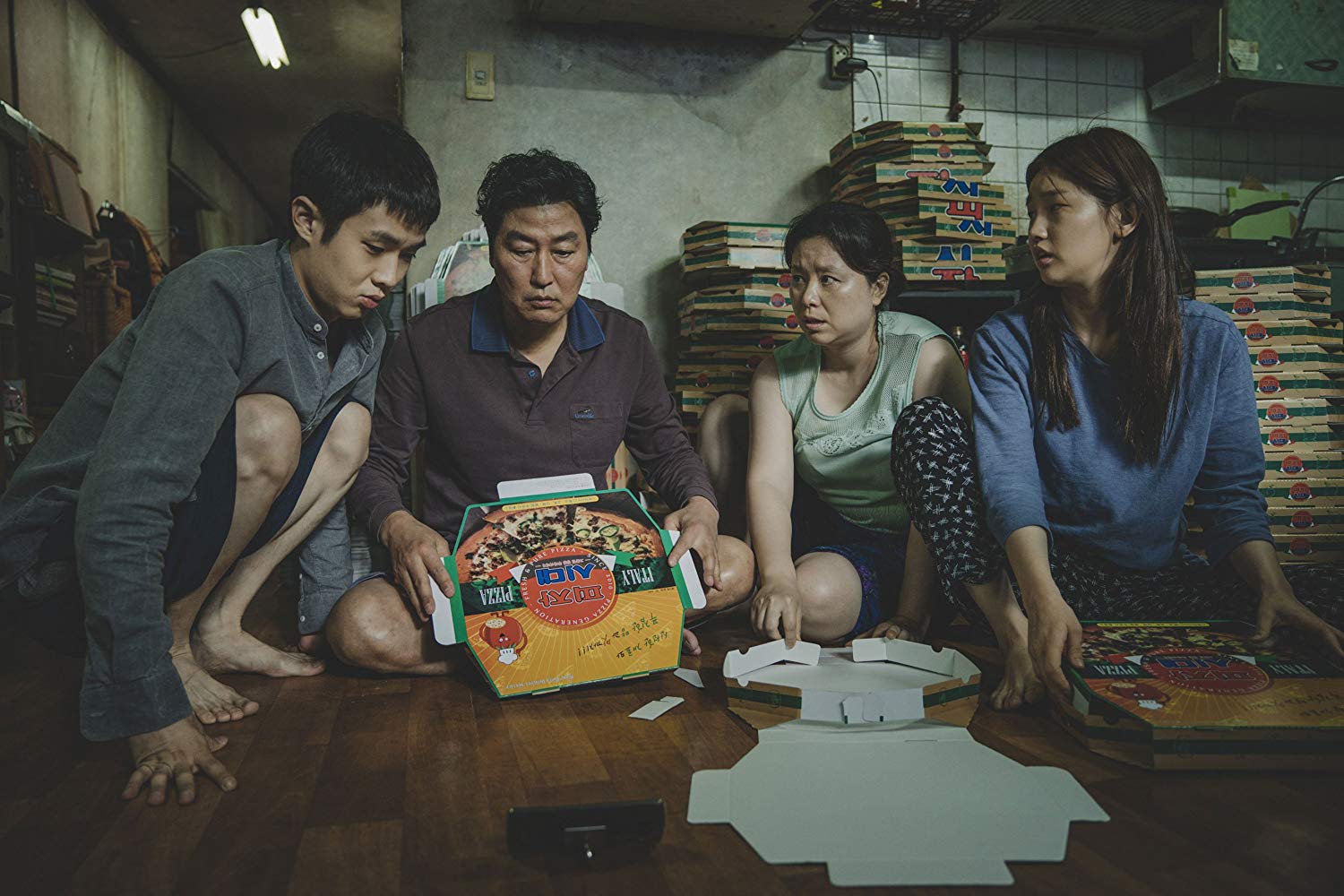(This story was originally published in print on Oct. 17, 2019).
As the exposure between the poor and the rich remains a common theme in modern films, “Parasite” brings a distinct perspective of the commonly viewed “evil” high-class through a comedic, yet thrilling story of the problematic society in modern Korea. Directed by Bong Joon-ho, the 2019 Cannes Film Festival award-winning dark comedy forces a twisted smile on the audience.
FROM LAUGHTER TO HORROR
The impoverished Kim family, consisting of dad Ki-taek, portrayed by Song Kang-ho, mom Choong-Sook, portrayed by Jang Hye-jin, son Ki-woo, portrayed by Choi Woo-sik and daughter Ki-jung, portrayed by Park So-dam, fold pizza boxes for money and live in a complex that’s nearly underground. The constant mood of Bong’s humor progresses as the Kim family enters the home of the wealthy Park family like a parasite. While the situations of the Kim family offer laughs at first, the story quickly descends into an endless stair of darkness. After the climactic twist from the movie’s humor to horror, the audience can leave the movie with an uncomfortable feeling of emptiness in their laughter.
NOT A SOLUTION BUT REALITY
While many movies promote the idea of the high class being intentionally “evil” for their own desires for wealth and fame, Bong shows a slightly different portrait of the rich in his film. Bong rather portrays the wealthy Park family as people who have tried their best to accomplish their current wealthy status and have no fundamental recognition or understandings of those who live opposite lives. The father of the Park family, Dong-ik, portrayed by Lee Sun-kyun, identifies Ki-taek’s scent as the only thing he dislikes. Park’s unintentional hate of Ki-taek’s scent represents the realistic gap between the poor and the rich. As smell ultimately triggers the climactic twist in the film, it presents how Ki-taek’s does not target his anger toward the rich, but toward the irreparable social gap that exists between him and the Park family. Through this representation, Bong throws the uncomfortable reality of how the current problematic society looks, rather than shooting down the rich for an easy solution.
DON’T PLAN
Before the film reaches a climactic twist, the Kim family sleeps at a rehabilitation center after a strong flood drowns their house. Ki-woo turns over to his father and asks him what the next plan is. “After all these years, I found a solution—it’s not to plan at all,” Ki-taek said. Nothing has worked out as planned for Ki-taek, and through Ki-taek’s ultimate conclusion of life, Bong shows that society provides people like the Kim family only one despairing option—to constantly feed off people with the ability to make actual decisions that can somehow help them achieve a comfortable, wealthy lifestyle.
STONE AS SYMBOLISM
Throughout the film, Ki-woo constantly holds onto an ornamental stone that an old friend gave him as a gift that represents luck and blessings. “Wow, this is so symbolic,” Ki-woo said as he carefully examined the meaningless stone. The stone symbolizes a meaningless ambition that hosts on Ki-woo both mentally and physically. As the Kim family hosts on the Park family and destroys their pleasant home, the stone also works as a parasite that sticks onto Ki-woo. This becomes a false hope of an increased social status, inflicting him with an unplanned ambition, an evolution of Ki-taek’s ultimatum.
BONG COUNTERPUNCHES AMERICAN FILM CULTURE
Through “Parasite,” Bong emphasizes the need for more Korean film recognition. The distinct Korean culture melted into a universal dystopia impressed not only the Cannes Film Festival, but the Oscars as well. In a recent interview with Vulture, Bong received a question asking why Korean films have not received an Oscar nomination, despite their strong influence on the film industry.
“It’s a little strange, but it’s not a big deal,” Bong said. “The Oscars are not an international film festival. They’re very local.”
Bong’s reply to this interview counters the American-dominant film industry. As Bong’s approved masterwork and unique storytelling shocked the world with the amazing potential of international films, he has brought up the argument that audiences naturally appreciate American more than international films.
















